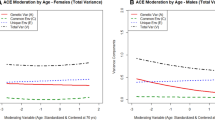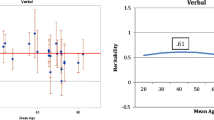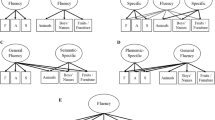Abstract
We used a sub-sample from the Older Australian Twins Study to estimate the heritability of performance on three tests of language ability: Boston Naming Test (BNT), Letter/Phonemic Fluency (FAS) and Category/Semantic Fluency (CFT) Tests. After adjusting for age, sex, education, mood, and global cognition (GC), heritability estimates obtained for the three tests were 0.35, 0.59, and 0.20, respectively. Multivariate analyses showed that the genetic correlation were high for BNT and CFT (0.61), but low for BNT and FAS (0.17), and for FAS and CFT (0.28). Genetic modelling with Cholesky decomposition indicated that the covariation between the three measures could be explained by a common genetic factor. Environmental correlations between the language ability measures were low, and there were considerable specific environmental influences for each measure. Future longitudinal studies with language performance and neuroimaging data can further our understanding of genetic and environmental factors involved in the process of cognitive aging.


Similar content being viewed by others
References
Abrahams S, Goldstein LH, Simmons A, Brammer MJ, Williams SC, Giampietro VP, Andrew CM, Leigh PN (2003) Functional magnetic resonance imaging of verbal fluency and confrontation naming using compressed image acquisition to permit overt responses. Hum Brain Mapp 20(1):29–40. https://doi.org/10.1002/hbm.10126
Akaike H (1987) Factor analysis and AIC. Psychometrika 52(3):317–332. https://doi.org/10.1007/bf02294359
Amieva H, Jacqmin-Gadda H, Orgogozo JM, Le Carret N, Helmer C, Letenneur L, Dartigues JF (2005) The 9 year cognitive decline before dementia of the Alzheimer type: a prospective population-based study. Brain 128(Pt 5):1093–1101. https://doi.org/10.1093/brain/awh451
Baldo JV, Schwartz S, Wilkins D, Dronkers NF (2006) Role of frontal versus temporal cortex in verbal fluency as revealed by voxel-based lesion symptom mapping. J Int Neuropsychol Soc 12(6):896–900. https://doi.org/10.1017/S1355617706061078
Benton AL, Hamsher KS (1976) Multilingual aphasia examination: manual of instruction. University of Iowa, Iowa City
Boker S, Neale M, Maes H, Wilde M, Spiegel M, Brick T, Spies J, Estarbook R, Kenny S, Bates T, Mehta P, Fox J (2011) OpenMx: an open source extended structural equation modeling framework. Psychometrika 76(2):306–317. https://doi.org/10.1007/s11336-010-9200-6
Brouillette RM, Martin CK, Correa JB, Davis AB, Han H, Johnson WD, Foil HC, Hymel A, Keller JN (2011) Memory for names test provides a useful confrontational naming task for aging and continuum of dementia. J Alzheimers Dis 23(4):665–671. https://doi.org/10.3233/JAD-2011-101455
de Azeredo Passos VM, Giatti L, Bensenor I, Tiemeier H, Ikram MA, de Figueiredo RC, Chor D, Schmidt MI, Barreto SM (2015) Education plays a greater role than age in cognitive test performance among participants of the Brazilian Longitudinal Study of Adult Health (ELSA-Brasil). BMC Neurol 15(1):191
Dong Y, Gan DZ, Tay SZ, Koay WI, Collinson SL, Hilal S, Venketasubramanian N, Chen C (2013) Patterns of neuropsychological impairment in Alzheimer’s disease and mixed dementia. J Neurol Sci 333(1):5–8. https://doi.org/10.1016/j.jns.2013.05.011
Donovan NJ, Okereke OI, Vannini P, Amariglio RE, Rentz DM, Marshall GA, Johnson KA, Sperling RA (2016) Association of higher cortical amyloid burden with loneliness in cognitively normal older adults. JAMA Psychiatry 73(12):1230–1237. https://doi.org/10.1001/jamapsychiatry.2016.2657
Finkel D, Pederson NL, Larsson M (2001) Olfactory functioning and cognitive abilities: a twin study. J Gerontol: Ser B 56(4):226–233. https://doi.org/10.1093/geronb/56.4.P226
Finkel D, Reynolds CA, McArdle JJ, Pedersen NL (2005) The longitudinal relationship between processing speed and cognitive ability: genetic and environmental influences. Behav Genet 35(5):535–549. https://doi.org/10.1007/s10519-005-3281-5
Finkel D, Reynolds CA, Berg S, Pedersen NL (2006) Surprising lack of sex differences in normal cognitive aging in twins. Int J Aging Hum Dev 62(4):335–357. https://doi.org/10.2190/C39X-9QHY-49DM-X9GJ
Folstein MF, Folstein SE, McHugh PR (1975) “Mini-mental state”: a practical method for grading the cognitive state of patients for the clinician. J Psychiatr Res 12(3):189–198. https://doi.org/10.1016/0022-3956(75)90026-6
Fornito A, Zalesky A, Bassett DS, Meunier D, Ellison-Wright I, Yücel M, Wood SJ, Shaw K, O’Connor J, Nertney D, Mowry BJ, Pantelis C, Bullmore ET (2011) Genetic influences on cost-efficient organization of human cortical functional networks. J Neurosci 31(9):3261–3270. https://doi.org/10.1523/JNEUROSCI.4858-10.2011
Giubilei F, Medda E, Fagnani C, Bianchi V, De Carolis A, Salvetti M, Sepe-Monti M, Stazi MA (2008) Heritability of neurocognitive functioning in the elderly: evidence from an Italian twin study. Age Ageing 37(6):640–646. https://doi.org/10.1093/ageing/afn132
Glisky EL (2007) Changes in cognitive function in human aging. In: Riddle DR (ed) Brain aging: models, methods, and mechanisms. CRC Press, Boca Raton, pp 3–20
Goodglass H, Kaplan E (1987) Boston diagnostic aphasia examination (BDAE), 2nd edn. Lea & Febiger, Philadelphia
Harrison JE, Buxton P, Husain M, Wise R (2000) Short test of semantic and phonological fluency: normal performance, validity and test-retest reliability. Br J Clin Psychol 39(Pt 2):181–191. https://doi.org/10.1348/014466500163202
Hawkins KA, Sledge WH, Orleans JF, Quinlan DM, Rakfeldt J, Huffman RE (1993) Normative implications of the relationship between reading vocabulary and Boston naming test performance. Arch Clin Neuropsychol 8(6):525–537. https://doi.org/10.1016/0887-6177(93)90053-4
Henry JD, Crawford JR (2004) A meta-analytic review of verbal fluency performance following focal cortical lesions. Neuropsychology 18(2):284–295. https://doi.org/10.1037/0894-4105.18.2.284
Henry J, Crawford JR (2005) A meta-analytic review of verbal fluency deficits in depression. J Clin Exp Neuropsychol 27(1):78–101. https://doi.org/10.1080/138033990513654
Henry JD, Crawford JR, Phillips LH (2004) Verbal fluency performance in dementia of the Alzheimer’s type: a meta-analysis. Neuropsychologia 42(9):1212–1222. https://doi.org/10.1016/j.neuropsychologia.2004.02.001
Kaplan E, Goodglass H, Weintraub S (2001) Boston naming test, 2nd edn. Lea & Febiger, Philadelphia
Lee T, Henry JD, Trollor JN, Sachdev PS (2010) Genetic influences on cognitive functions in the elderly: a selective review of twin studies. Brain Res Rev 64(1):1–13. https://doi.org/10.1016/j.brainresrev.2010.02.001
Lee T, Mosing MA, Henry JD, Trollor JN, Lammel A, Ames D, Martin NG, Wright MJ, Sachdev PS (2012a) Genetic influences on five measures of processing speed and their covariation with general cognitive ability in the elderly: the older Australian twins study. Behav Genet 42(1):96–106. https://doi.org/10.1007/s10519-011-9474-1
Lee T, Mosing MA, Henry JD, Trollor JN, Ames D, Martin NG, Wright MJ, Sachdev PS, OATS Research Team (2012b) Genetic influences on four measures of executive functions and their covariation with general cognitive ability: the Older Australian Twins Study. Behav Genet 42(4):528–538. https://doi.org/10.1007/s10519-012-9526-1
Lee T, Lipnicki DM, Crawford JD, Henry JD, Trollor JN, Ames D, Wright MJ, Sachdev PS, OATS Research Team (2014) Leisure activity, health, and medical correlates of neurocognitive performance among monozygotic twins: The Older Australian Twins Study. J Gerontol B 69(4):514–522. https://doi.org/10.1093/geronb/gbt031
Leyton CE, Villemagne VL, Savage S, Pike KE, Ballard KJ, Piguet O, Burrell JR, Rowe CC, Hodges JR (2011) Subtypes of progressive aphasia: application of the international consensus criteria and validation using β-amyloid imaging. Brain 134(Pt 10):3030–3043. https://doi.org/10.1093/brain/awr216
Lezak MD, Howieson DB, Bigler E, Tranel D (2012) Neuropsychological assessment (fifth edition). Oxford University Press Inc., Oxford
Luoni C, Balottin U, Rosana L, Savelli E, Salini S, Termine C (2015) Confrontation naming and reading abilities at primary school: a longitudinal study. Behav Neurol 2015:981548. https://doi.org/10.1155/2015/981548
Lykken DT, Bouchard TJ Jr, McGue M, Tellegen A (1993) Heritability of interests: a twin study. J Appl Psychol 78(4):649
McClearn GE, Johansson B, Berg S, Pedersen NL, Ahern F, Petrill SA, Plomin R (1997) Substantial genetic influence on cognitive abilities in twins 80 or more years old. Science 276:1560–1563
McGue M, Christensen K (2001) The heritability of cognitive functioning in very old adults: evidence from Danish Twins aged 75 years and older. Psychol Aging 16(2):272–280. https://doi.org/10.1037/0882-7974.16.2.272
Neale MC, Cardon LR (1992) Methodology for genetic studies of twins and families. Kluwer Academic Publishers, Dordrecht
Nelson HE, Willison JR (1991) National adult reading test (NART) test manual, 2nd edn. NFER-Nelson, Windsor
Pedersen NL, Plomin R, Nesselroade J, McClearn GE (1992) A quantitative genetic analysis of cognitive abilities during the second half of the life span. Psychol Sci 3(6):346–352. https://doi.org/10.1111/j.1467-9280.1992.tb00045
Pérusse L, Rice T, Chagnon YC, Tremblay A, Rao DC, Bouchard C (2000) A genome-wide linkage analysis of genes related to energy and macronutrient intake in the Quebec Family Study. Obes Res 8:20S-20S
Purcell S (2002) Variance components models for gene–environment interaction in twin analysis. Twin Res 5:554–571
Read S, Pedersen NL, Gatz M, Berg S, Vuoksimaa E, Malmberg B, Johansson B, McClearn GE (2006) Sex differences after all those years? Heritability of cognitive abilities in old age. J Gerontol B 61(3):P137–P143. https://doi.org/10.1093/geronb/61.3.p137
Reynolds CA, Finkel D (2015) A meta-analysis of hertitability of cognitive aging: minding the "missing heritability" gap. Neuropsychol Rev 25(1):97–112
Roca M, Manes F, Chade A, Gleichgerrcht E, Gershanik O, Arévalo GG, Torralva T, Duncan J (2012) The relationship between executive functions and fluid intelligence in Parkinson’s disease. Psychol Med 42(11):2445–2452. https://doi.org/10.1017/s0033291712000451
Rowe JW, Kahn RL (1997) Successful aging. Gerontologist 37(4):433–440. https://doi.org/10.1093/geront/37.4.433
Ruff RM, Light RH, Parker SB, Levin HS (1997) The psychological construct of word fluency. Brain Lang 57(3):394–405. https://doi.org/10.1006/brln.1997.1755
Sachdev PS, Lammel A, Trollor JN, Lee T, Wright MJ, Ames D, Wen W, Martin NG, Brodaty H, Schofield PR, OATS Research Team (2009) A comprehensive neuropsychiatric study of eldeerly twins: the Older Australian Twins Study. Twin Res Hum Genet 12(6):573–582. https://doi.org/10.1375/twin.12.6.573
Shao Z, Janse E, Visser K, Meyer AS (2014) What do verbal fluency tasks measure? Predictors of verbal fluency performance in older adults. Front Psychol 5:772. https://doi.org/10.3389/fpsyg.2014.00772
Swan GE, Carmelli D (2002) Evidence of genetic mediation of executive control: a study of aging male twins. J Gerontol B 57(2):P133–P143. https://doi.org/10.1093/geronb/57.2.p133
Tombaugh TN, Kozak J, Rees L (1999) Normative data stratified by age and education for two measures of verbal fluency: FAS and animal naming. Arch Clin Neuropsychol 14(2):167–177. https://doi.org/10.1016/S0887-6177(97)00095-4
Tucker-Drob EM, Briley DA (2014) Continuity of genetic and environmental influences on cognition across the life span: a meta-analysis of longitudinal twin and adoption studies. Psychol Bull 140(4):949–979. https://doi.org/10.1037/A0035893
Whiteside DM, Kealey T, Semla M, Luu H, Rice L, Basso MR, Roper B (2016) Verbal fluency: language or executive function measure? Appl Neuropsychol Adult 23(1):29–34. https://doi.org/10.1080/23279095.2015.1004574
Yesavage JA (1988) Geriatric Depression Scale. Psychopharmacol Bull 24(4):709–711
Zhang H, Sachdev PS, Wen W, Kochan NA, Crawford JD, Brodaty H, Slavin MJ, Reppermund S, Kang K, Trollor JN (2013) Grey matter correlates of three language tests in non-demented older adults. PLoS ONE 8(11):e80215. https://doi.org/10.1371/journal.pone.0080215
Acknowledgements
This research was facilitated through the Australian Twin Registry, a national research resource in part supported by a Centre of Research Excellence Grant from the NHMRC (ID No. 1079102). We thank the participants for their generous contributions to this study. We also thank and acknowledge the editorial assistance of Dr Sophia Dean in the preparation of this manuscript.
Funding
The Older Australian Twins Study was supported by the National Health and Medical Research Council (NHMRC, ID No. 401162).
Author information
Authors and Affiliations
Consortia
Corresponding author
Ethics declarations
Conflict of interest
T. Lee, A. Thalamuthu, J. D. Henry, J. N. Trollor, D. Ames, M. J. Wright, P. S. Sachdev and OATS Research Team declare that they have no conflict of interest.
Ethical approval
All procedures/assessments performed in this study involving human participants were in accordance with, and approved by the Human Research Ethics Committee (HC No. 12599) of the University of New South Wales, Australia.
Human and animal rights
All procedures followed were in accordance with the ethical standards of the responsible committee on human experimentation (institutional and national) and with the Helsinki Declaration of 1975, as revised in 2000 (5).
Informed consent
Informed consent was obtained from all individual participants included in the Older Australian Twins Study.
Additional information
Edited by Deborah Finkel.
Electronic supplementary material
Below is the link to the electronic supplementary material.
Rights and permissions
About this article
Cite this article
Lee, T., Thalamuthu, A., Henry, J.D. et al. Genetic and Environmental Influences on Language Ability in Older Adults: Findings from the Older Australian Twins Study. Behav Genet 48, 187–197 (2018). https://doi.org/10.1007/s10519-018-9897-z
Received:
Accepted:
Published:
Issue Date:
DOI: https://doi.org/10.1007/s10519-018-9897-z




